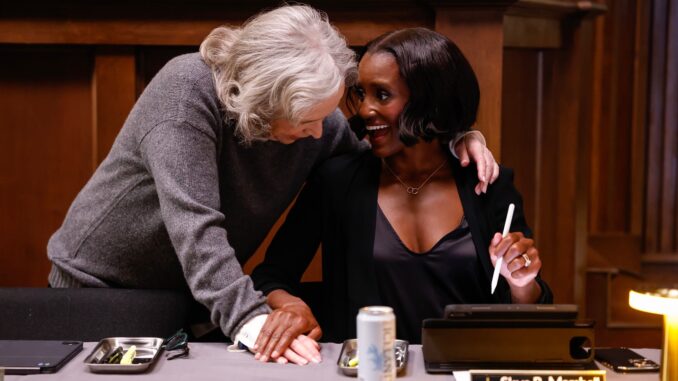
The digital clock on the old VCR blinks “12:00” in an eternally optimistic loop, a relic in a world where “Matlock 2025” is not just a concept, but a vibrant reality. The announcement had sent ripples of both curiosity and skepticism through the entertainment landscape: a modern reboot, yes, but with a twist that felt less like a risk and more like destiny. Kathy Bates, donning the tweed and wisdom, was to be the venerable attorney. And from the moment the first promo dropped, a quiet, knowing hum began to spread: this was where Kathy Bates would unequivocally prove her acting class is unrivaled.
Her Matlock – let’s call her Martha Matlock – isn’t a carbon copy of the folksy, unassuming Andy Griffith. Bates infuses the character with a different kind of Southern charm, one steeped in a knowing weariness, a sharp wit that cuts like glass wrapped in velvet, and an undercurrent of formidable intelligence that feels less like a performance and more like a primal force. Where Griffith’s Matlock disarmed with a smile and a shrug, Bates’s Martha does so with a piercing gaze, a slight, almost imperceptible tilt of the head, and a voice that can be a comforting balm or a sudden, cracking whip. It’s a seismic shift, a tapestry woven with threads of folksy charm and razor-sharp intellect, and Bates, with every nuanced gesture, every perfectly timed pause, makes it utterly, profoundly her own.
Consider the courtroom, the hallowed ground where Matlock truly shines. In “The Case of the Silicon Serpent,” Martha Matlock is cross-examining Dr. Aris Thorne, a charismatic tech CEO accused of corporate espionage leading to a rival’s tragic demise. Thorne is slick, unflappable, a master of deflection. The young prosecutor, all eager ambition, has failed to land a blow. Martha rises, her gait measured, her presence filling the sterile hum of the modern courtroom with an old-world gravity.
“Dr. Thorne,” her voice begins, a gentle murmur. “A man of your… persuasion… would you say you enjoy a good game?”
Thorne smiles, a practiced, confident smirk. “I enjoy winning, Ms. Matlock.”
Martha nods, a small, thoughtful gesture. Her eyes, however, are two points of obsidian, unwavering. “Ah, winning. A common human desire. But in your industry, Doctor, isn’t it true that ‘winning’ often means knowing your opponent’s hand before they even play it?”
She leans slightly forward, her posture deceptively soft. “You stated earlier, under oath, that you had no knowledge of your competitor’s proprietary algorithms until they were publicly disclosed. Yet, we have an email here…” She holds up a tablet, the screen glowing. “…sent from an anonymous account, but traced back to an IP address within your company’s subnet, two weeks before the public disclosure. The subject line reads: ‘Project Chimera – Full Spec.’ Does that ring a bell, Doctor?”
Thorne falters, a flicker of panic in his eyes, quickly masked. “A phishing attempt. We get hundreds.”
Martha’s smile is now gone. Her voice, a smooth Southern river, suddenly finds a hidden current, growing deeper, more insistent. “A phishing attempt that contained a complete blueprint of Project Chimera, a project so secret, so meticulously guarded, that only a handful of individuals had access. And curiously, Dr. Thorne, the language used in this ‘phishing attempt’ mirrored your own unique syntax, your idiosyncratic turn of phrase, which your former assistant, Ms. Albright, testified to earlier today.”
She doesn’t raise her voice; she compresses it, injecting it with an unspoken accusation that makes the air crackle. Her eyes bore into Thorne, not just seeing him, but seeing through him, stripping away his composure layer by layer. The gentle river had become a torrent, smashing against the bedrock of his lies. It’s not a shout; it’s a quiet, devastating dissection, performed with surgical precision. This is where Bates elevates “acting” to an art form, not through histrionics, but through an almost spiritual communion with the truth of the scene. The audience doesn’t just witness a lawyer; they witness the unraveling of a man, orchestrated by a master.
But “Matlock 2025” under Bates’s masterful hand isn’t just about the courtroom theatrics. Her unrivaled class shines just as brightly in the quiet moments. Picture Martha Matlock in her dimly lit study, the scent of old books and bourbon lingering, advising a heartbroken client. The lines etched around her eyes speak of a thousand stories, a weariness that is less about age and more about the burdens of justice. She listens, her head bowed slightly, a hand resting on her chin, absorbing every fragmented detail, every raw emotion.
When she finally speaks, it’s not with legal jargon, but with a profound empathy that feels earned, not performed. “Child,” she might say, her voice soft as a worn flannel shirt, “the law ain’t always fair, but it’s the best tool we got to carve out a little piece of justice. We may not get you everything you want, but we’ll fight like hell for what you deserve.” In that single glance, that nuanced shift of tone from gruff wisdom to genuine compassion, Bates conveys more about the human condition than a dozen monologues. She doesn’t just deliver lines; she embodies a lifetime of experience, sorrow, and unshakeable resolve.
Kathy Bates’s Matlock is a revelation, not because it reinvents the wheel, but because it reminds us of the profound depth an actor can bring to even the most familiar archetype. She doesn’t just inhabit a role; she becomes the role, while simultaneously reminding you that only she could have done it. Her portrayal in “Matlock 2025” is a master class in the very essence of acting: the subtle power of stillness, the devastating impact of a perfectly timed word, the ability to convey volumes with a flicker of the eye. It is, without hyperbole, proof that her acting class is not just superior, but truly unrivaled. The old VCR still blinks, but the future of legal drama, under Bates’s formidable charm, has never looked sharper.
